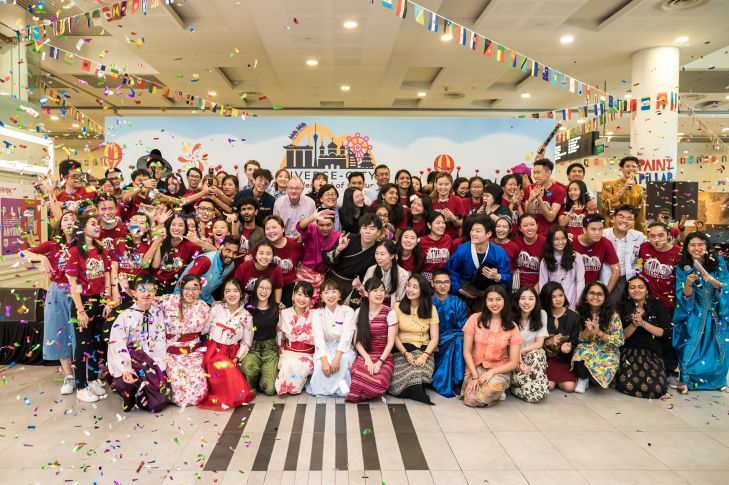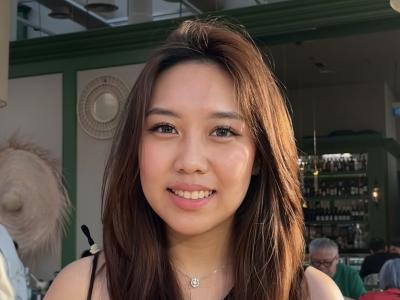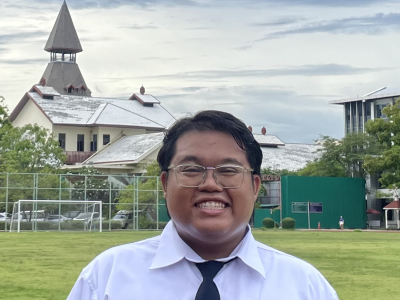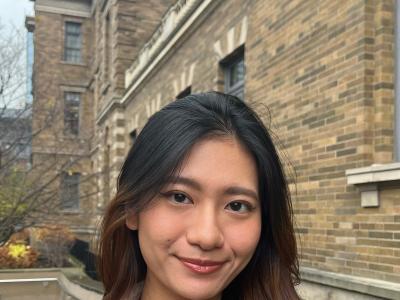
Students who are culturally fluent gain a strong competitive edge as they step out into an increasingly diverse and global working environment. As part of the Singapore Management University’s proactive approach towards nurturing students who thrive as global citizens in a borderless world, Diverse-City was launched on 11 September 2019.
Organised by SMU International Connections (ICON), Diverse-City is a ground-up initiative that aims to foster appreciation of different cultures and identities. SMU ICON comprises students from the University’s international students club, who worked closely with the Office of Dean of Students (Diversity, Inclusion & Integration) led by Professor Paulin Tay Straughan, Professor of Sociology (Practice) and Dean of Students, to map out a week-long festival of fun-filled and experiential activities that celebrates cultural diversity.
Over the years, SMU ICON had successfully organised the annual SMU Global Village event, which promoted cultural and community learning among students. The event served to illustrate how the concept of a “village” represents the spirit of a cohesive community, where individuals of different nationalities and ethnicities forge social bonds and take care of one other. Diverse-City offered a fresh take of Global Village by reimagining the festival as “A Wonderland of Cultures”.

“Integration has always been one of the core values of SMU ICON. With events like this, you get to learn about other cultures and make new friends along the way,” said Cavier Ong, SMU ICON President and a Year 3 undergraduate at SMU Lee Kong Chian School of Business. “This year, we took a different view in terms of interpreting cultural diversity. Past instalments had focused on traditional cultural aspects. This year, the organising committee decided to look at modern cultural elements which altogether contribute to the rich diversity within a city.”
Kicking off with a dance performance by students of 20 nationalities, the festival opened on 11 September 2019. This was the first stop of a cultural parade that started from the Lee Kong Chian School of Business Atrium and made its way through the underground linkway before culminating at the SMU T-junction. Students delivered high-octane dance routines that energised the crowds.

With Diverse-City, the SMU basement concourse was transformed into a vibrant kaleidoscope of food, crafts, song and dance. Students, staff and faculty of SMU, including SMU Provost Prof Timothy Clark got to explore a wide array of multi-cultural activities hosted in the area. They also had the opportunity to experience the rich diversity and gamut of different cultural traditions hosted by student facilitators of SMU ICON’s 12 sub-clubs, many of whom were garbed in traditional dresses and accessories at the pavilions.
At the Korean pavilion, curious participants learnt how to tie a “lamb head towel” and to crack a hard boiled egg on a friend’s head, within the simulated environment of a Korean jjimjilbang. A Korean jjimjilbang is a large, gender-segregated public bathhouse in Korea, furnished with hot tubs, showers and traditional kiln saunas. Over at the Japanese pavilion, participants gamely climbed into a mock capsule hotel to test the comfort of one of Japan’s most ubiquitous innovation.
Thirsty participants got to indulge in a “Singapore Sling” inspired mocktail and enjoy munching on ground nuts at the Singapore pavilion, which was dressed up in a replica of the famed Long Bar at Raffles Hotel. While rubbing shoulders with fellow mocktail enthusiasts, participants retraced the history of the iconic drink, learning that the Singapore Sling was in fact developed by a bartender working at the Long Bar in 1915. Back then, it was socially unacceptable for women to drink in public, but the Singapore Sling was so colourful that many believed it was fruit juice. It quickly became a hit.
Meantime, student facilitators at the Chinese pavilion introduced the technique of tie-dying to participants. Equipped with a history of 1,500 years in the Middle Kingdom, tie-dying fabric reached its peak in the Tang dynasty and tie-dyed clothing became fashionable for the upper class. It still enjoys popularity among the ethnic minorities in southwest China’s Yunnan and Guizhou provinces. Others sampled Indian cuisine and tested their puzzle solving skills at the Amazing French Metro. The food booths teemed with healthy queues, with participants eager to sample the diverse and delectable spread of pastries and cuisines.

“Such events make you appreciate the diversity of culture, as well as how culturally vibrant SMU is!” commented Radhika Todi, Co-chairperson of Diverse-City 2019 and a Year 3 undergraduate at SMU Lee Kong Chian School of Business. “The best thing about this year’s event would be the cultural parade. The thing that makes it so memorable are the people who were part of it. 20 non dancers turned into outstanding performers over a span of just three weeks! After putting in many hours of work, it was very rewarding to see everything come together!”
“Participants of the cultural parade comprised students who had minimum performing background,” added Cavier. “They spent countless hours practising. You could feel their passion, excitement and the fun they had during the parade. That’s what made the biggest impact on me.”

SMU Diverse-City, which runs from 11-20 September 2019, includes cultural workshops and talks organised by SMU ICON’s 12 sub-clubs and a picnic under the stars titled "Dine in a Whole New World" at SMU Campus Green. Activities are open to members of the community. The wide range of cultural and community learning events organised, bringing people of myriad nationalities and backgrounds together in celebration of cultural diversity and unity, are part of the University’s efforts to nurture global-ready students who can thrive in an increasingly interconnected world.
Photo credits: Singapore Management University


